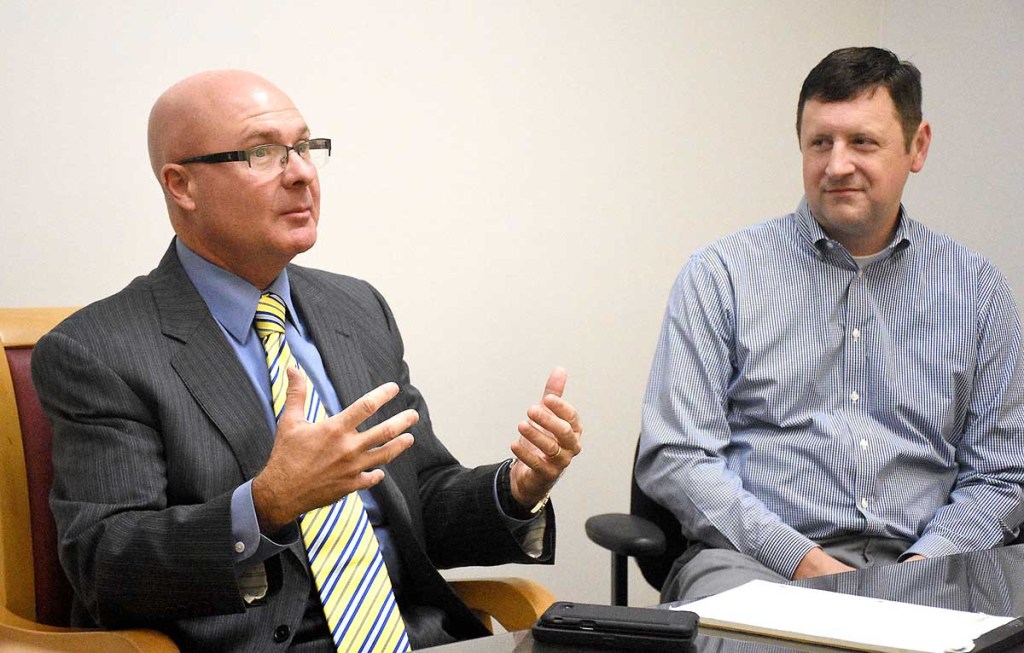Watson to lead mental health committee
Published 5:30 am Friday, September 7, 2018

- Neal Morrison, CEO of the Sanctuary at the Woodlands, speaks at Thursday’s meeting of Cullman’s mental health coalition, while WellStone Director Chris Van Dyke looks on.
A local committee that is focusing on the mental health needs of Cullman County now has a new leader.
Cullman County Associate Commissioner Kerry Watson has taken charge of the committee, and Neal Morrison, CEO of the Sanctuary at the Woodlands welcomed Watson to the committee’s meeting at the Sanctuary Thursday morning.
Trending
“We’re very elated and honored that Kerry Watson has said, ‘I’ll step in and help,’” he said. “Most of them don’t want to jump in that ring and grab ahold of it, but Kerry did.”
Having a local elected official in charge of the committee helped secure a grant that should be able to provide better mental health care for people in the area, and should help get more grants in the future, Morrison said.
The grant, which will take effect on Oct. 1, will allow the hiring of a mental health case manager who will work with the Cullman County Sheriff’s Office and Cullman Regional.
WellStone Behavioral Health Director Chris Van Dyke said the case manager will focus on people who have been in and out of the hospital or jail in a short time, and will look to direct those people to treatment options instead of letting them keep repeating the same cycle.
“The number one goal is to reduce the number of return trips that people have, either to the ER or the jail,” he said. “We’re going to see what services they need to make sure they don’t come back again.”
Van Dyke also spoke about the use of a new drug that is available for use at the Cullman County Detention Center and Cullman Regional.
Trending
Vivitrol blocks a person’s ability to feel the effects of opioids or alcohol for up to 30 days, and reduces cravings by 55 percent, meaning that the person has a month of living without feeling the effects of opioids or alcohol and does not have the same cravings that they usually would.
“If we can get somebody detoxed and off the opioids and start them on this medicine before they leave the hospital or jail, now they’ve got a month at least of experiencing what it’s like to be clean,” he said.
Vivitrol is not the full answer to someone’s addiction, as counseling is still needed to help people after they begin taking it, but local mental health professionals are excited about the drug’s potential, Van Dyke said.
Most of the committee’s work over the first year of its existence has been focused on adults, but the committee will be looking in the near future to expand their work in local schools, Morrison said.
The work that has already been done for mental health in Cullman County schools has not gone unnoticed, as there are other communities in the state that are looking here as an example of good cooperation and communication between agencies.
Morrison said one example of that is a partnership that WellStone has with local school systems to send professionals out to schools if they are needed, and the state has added $500,000 to the budget for other school systems to enter into similar partnerships.
He said Cullman will not benefit from that additional funding because the relationship already exists, but he and other members of the committee will be at the state legislature asking for more school mental health funding that will come back to Cullman.
“What we’re doing in Cullman is making an impact statewide,” he said. “Because other people are seeing this and wanting to replicate it.”
Morrison said working for better mental health care does require funding, and members of the community have shown their support by donating to the Stephen K. Griffith Memorial Fund, which was established in June.
The fund has received $50,000 in donations so far and is halfway to its goal of $100,000 by the end of the year, and more donations are always being accepted, he said.
Stephen K. Griffith Memorial Fund
c/o Cullman Area Mental Health Foundation
P.O. Box 2186
Cullman, AL 35056.






